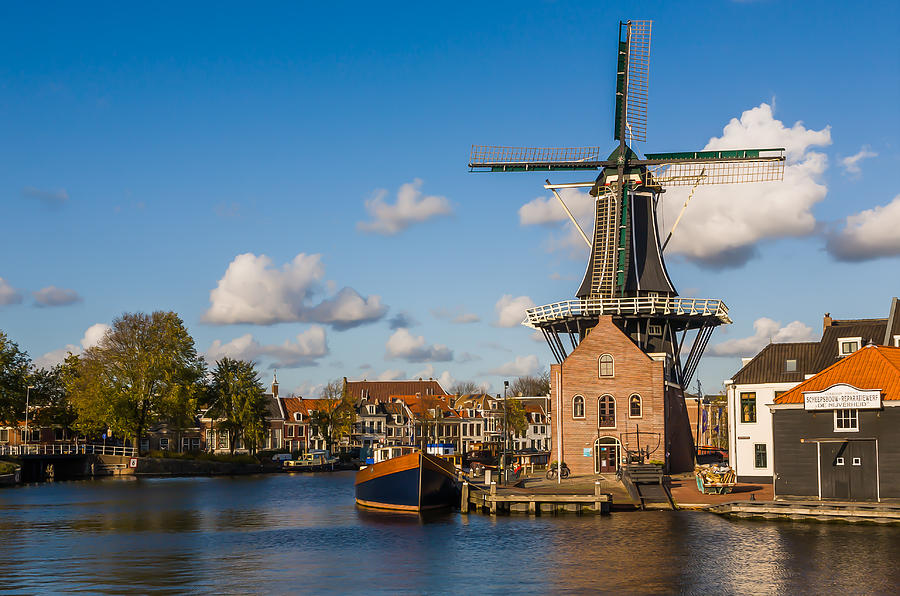 In the land of Holland known for its windmills and
tulips, close to the costal dunes of the North Sea stands a city of Haarlem. It
has been a historic center of the tulip bulb-growing district for centuries.
But the city also holds another treasure.
In the land of Holland known for its windmills and
tulips, close to the costal dunes of the North Sea stands a city of Haarlem. It
has been a historic center of the tulip bulb-growing district for centuries.
But the city also holds another treasure.
A long time ago, on the outskirts of the city of
Haarlem, near the crossroads by the Old Inn stood a small farm. On that small
farm with hatched yellow roof and white-washed walls stood a tiny hut, where
Hans lived with his wife.
Hans was a cheesemaker and travelled to the nearby
town of Amsterdam to trade his cheese for money and a few bulbs for his wife to
plant in her garden. Hans had a good head on his shoulders, while Kaatje was a
dreamer, but he loved her very much.
One day, as Hans was processing cheese in the dairy,
he hadn’t heard one note of his wife’s humming. Kaatje, the dreamer, would
normally hum over each bulb while planting it, but not this morning. So Hans
asked her, “What’s wrong Kaatje? I haven’t heard even one note today.”
“Oh, dear. I had such a strange dream and it was so
real,” she replied.
Hans chuckled as this wasn’t the first time Kaatje
dwelled over her dream. “Tell me what now you have dreamed.”
“A voice so real told me to go to Amsterdam and walk
around the Corn Exchange three times. After that I would be rich beyond the
wildest dreams,” she whispered.
Hans laughed, but seeing how serious his wife was
and not wanting to hurt her he agreed, “I’ll do it next time I’m in Amsterdam.”
But it wouldn’t be for another three days. Kaatje was restless and the
following morning slipped out of the house at the crack of the dawn and walked
the long walk to the city of Amsterdam.
Once in the city, she was tired and hungry, but her
excitement kept her walking. She walked around the Corn Exchange once, twice
and the final third time. But she couldn’t see any difference. She was till
poor and hungry and tired. She sat at the nearest bench with tears in her eyes.
“Do you need help?” a kind voice asked her. “I saw
you walking around the Corn Exchange and thought you might be lost.”
Kaatje raised her throbbing head up and saw a man
with a round smiley face. Before she knew she was telling him her silly dream.
The man laughed and said, “I once had a dream that I
went to the dairy farm near the crossroads by the Old Inn outside the town of
Haarlem, where a small hut stood. And behind it inside the dairy shed I dag out
a chest of gold.” He chuckled and added, “I guess we all have those silly
dreams. The only difference is not all of us follow them actually.” While
walking away he added some more, “You better go home and forget your dream.”
Kaatje couldn’t believe the words she just had
heard. She walked back home as fast as her legs would carry her. She forgot
about the hunger and pain.
Hans, not happy with his wife’s fool’s errand, didn’t
want to listen to her story. So she went to the dairy shed and began digging a hole
in the floor.
The pile of earth grew higher and the hole got
deeper and deeper with nothing in it. Hans despaired for his clean dairy, but
then the spade made a noise such as of a hitting metal. Kaatje and Hans peered
down into the hole. They dusted the earth with their hands and pulled a great
chest. Inside it shining coins spilled out. The great amount of the gold coins
kept them in great comfort to the rest of their days.
However, they were content with their way of life,
so they stayed at the farm near the crossroads by the Old Inn outside the town
of Haarlem. Hans continued his dairy work and went to Amsterdam every week.
Kaatje continued to hum while planting her bulbs, but she never remembered a
single dream of hers every again.
Source: 100 Classic Stories by Sandy Creek








